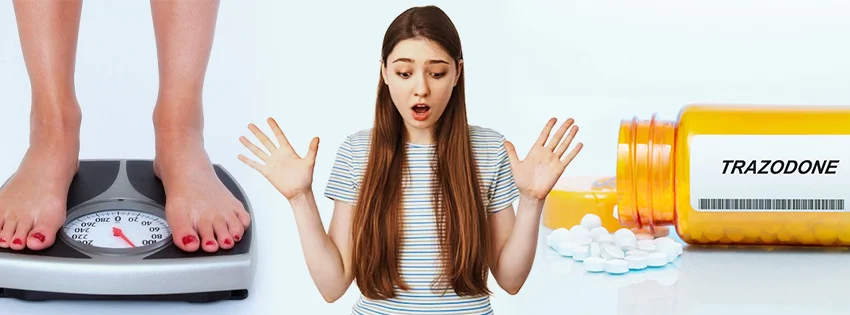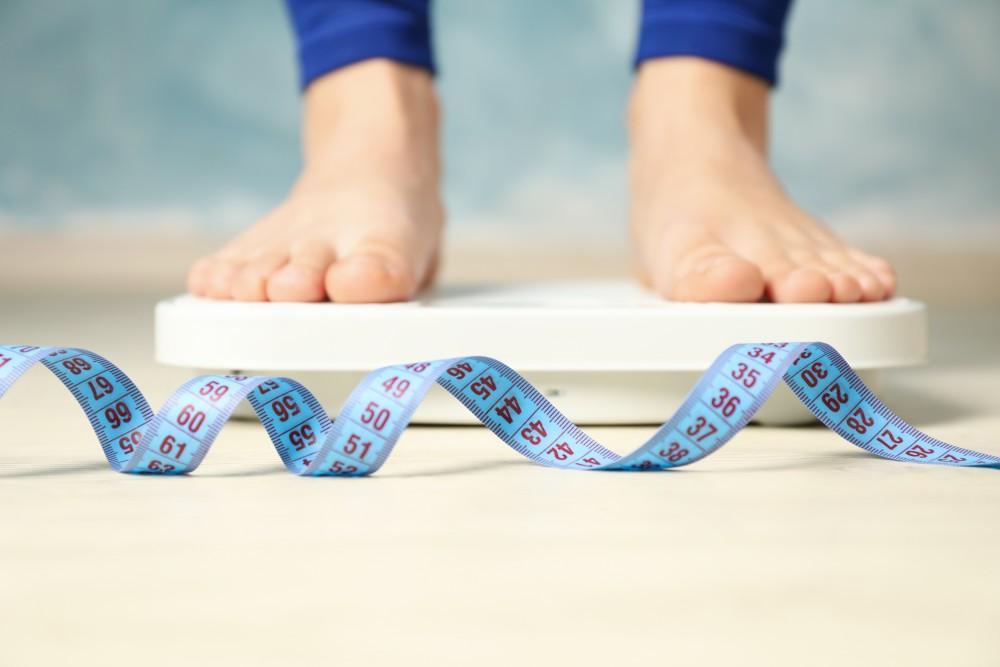Trazodone is a medication that is prescribed for the treatment of depression, anxiety, and other mental health conditions. Although it is generally tolerated by most patients, one question that many trazodone users ask is “Can trazodone cause weight gain?” This is because one of the side effects that has been reported in some cases by trazodone users is weight gain.
Experiencing weight gain can have drastic implications on your overall health and well-being. Therefore, you need to understand the relationship between trazodone and weight gain so you can make informed decisions and consult your healthcare provider on the best steps to take.
Key Takeaways
- Trazodone, an antidepressant drug that is commonly used in treating and managing depression and anxiety, belongs to a class of medications known as serotonin modulators.
- Most antidepressants are prone to causing weight gain for those who use it. Similarly, one side effect of trazodone is that it can result in weight gain which can be caused by different factors.
- Other common side effects of trazodone are dizziness or lightheadedness, dry mouth, drowsiness, nausea or vomiting and headache.
- When users of trazodone decide to stop taking the medication, they can suffer different withdrawal symptoms for a while. Weight loss is one withdrawal symptom that people who stop taking trazodone might experience.
An Overview of Trazodone

Trazodone is an antidepressant drug that is commonly used in treating and managing depression and anxiety. It belongs to a class of medications known as serotonin modulators.
What trazodone does is that it helps to improve and restore the balance of a natural chemical in the brain called serotonin. By doing so, it increases one’s appetite and energy level which will in turn help in managing and treating most symptoms of depression and anxiety.
Trazodone is often prescribed for people who have depressive disorders or anxiety disorders as it is a medication that helps ensure mental balance by restoring serotonin in the brain.
Can Trazodone Cause Weight Gain?
Most antidepressants are prone to causing weight gain for those who use it. Similarly, one side effect of trazodone is that it can result in weight gain.
Different factors can cause this weight gain that users of trazodone might experience. As we saw earlier, trazodone helps depressive patients in increasing their appetite levels. Such a person who has an increase in their appetite level and who has a low metabolism rate would definitely put on some weight. Hence, trazodone can cause weight gain in users.
Factors that Affect Weight Gain on Trazodone

Many factors determine whether a trazodone user will experience weight gain or not. Some of these are:
Appetite increase
Trazodone can either cause an increase or decrease in appetite. It differs for each person. Loss of appetite is one of the symptoms of depression. So naturally, when someone begins treatment with trazodone, their appetite may be improved. Some even crave certain foods rich in carbohydrates such as junk food. When this happens, such people could experience weight gain.
Drug interaction
Studies had shown that when users of trazodone took it simultaneously with other medications, the side effects of trazodone were amplified. So, in such users, side effects like weight gain would be more amplified and they would be put on more flesh than others.
Fat storage
Trazodone can affect the homeostatic process in its user’s body. This could result in the body storing more fat than it used to before the treatment started. Consequently, such people will gain weight.
Hormone levels
Trazodone can cause hormonal changes and this is another factor that influences weight gain in trazodone. These changes are more pronounced when the drug is taken over an extended period.
Improved taste
Studies have shown that depression affects the way food tastes to some people and this could affect their appetite. Now, trazodone seeks to treat that symptom by increasing serotonin. And in doing so, the person’s appetite is improved, they eat more and then gain some weight.
Slow metabolism
Most antidepressants are known for slowing down metabolism and the same goes for trazodone. The drug affects the body’s metabolism by regulating sugar and fat. So, even if the person is eating well enough and works out, they will still end up gaining some weight.
How Long Can You Lose Weight After Stopping Trazodone?

When users of trazodone decide to stop taking the medication, they can suffer different withdrawal symptoms for a while. It can be so bad that it could lead to an increase in the heart rate by up to 128 beats per minute or they could experience headaches or migraines, dizziness, insomnia, etc.
Likewise, weight loss is another withdrawal symptom that people who stop taking trazodone might experience. A person might begin to experience weight loss as a result of discontinuing their use of the antidepressant. This is because the withdrawal symptoms of trazodone often mimic the very symptoms of depression that a person might have been experiencing before.
The timeline for how long a person might experience these signs depends on several factors. These factors include: how dependent the person was on the antidepressant, the rate at which the person’s body processed the drugs, and the number of doses already consumed.
Typically, a person who has taken trazodone for a period of 8 weeks before stopping will experience more side effects than one who took it for a shorter time.
How Much Weight Do You Gain on Trazodone?

Various studies have been conducted to determine whether trazodone causes weight gain in some individuals and how much weight gain is in such individuals. It was then discovered that the gain was not so excessive.
One such study showed that people who took trazodone as an antidepressant gained an average of 0.6 kg (1.3 lbs) over a period of 12 weeks. Another study showed that people who took trazodone for insomnia gained an average of 0.5 kg (1.1 lbs) over a period of 6 weeks.
The effect of trazodone on each individual’s weight gain varies from one to the other. In fact, it has been proven that not everyone who takes trazodone experiences weight gain at all. And people who experience weight gain have different experiences compared to one another. This can result from factors such as genetics, lifestyle, diet, etc.
What Are the Most Common Side Effects of Trazodone?

Just like every other medication, Trazodone can result in some side effects which include:
Dizziness or lightheadedness
One major side effect of trazodone that you are likely to experience is dizziness, especially if it’s your first time taking it. It is more likely to occur if you stand up quickly or if you are dehydrated.
Dry mouth
Another side effect of trazodone is that it leaves you with a dry mouth. This is because trazodone reduces the production of saliva in the mouth. You can easily manage this by ensuring that you keep a bottle of water on you and taking occasional sips from it.
Drowsiness
As a sedative medication, one downside of trazodone is that it causes drowsiness and fatigue. This particular side effect can be different for others and more increased if it’s their first time taking trazodone or when they have taken an overdose.
Nausea or vomiting
Nausea or vomiting is another side effect that people experience when they take trazodone. However, this can be easily avoided by taking the medication with food to prevent nausea. Alternatively, you can even split your daily dose into smaller doses to be taken at intervals during the day.
Headache
Having headaches is another symptom peculiar to taking trazodone. This one in particular affects people when they first start taking the medication.
Constipation
Another side effect of trazodone is that it causes constipation by slowing bowel movement. However, this can easily be remedied by increasing your intake of water and consuming more fiber in your diet.
Blurred vision
Users of trazodone may also experience blurred vision as a result of their medication intake. As soon as you notice such changes, please ensure you speak to a healthcare provider to get proper treatment.
Sexual dysfunction
One other side effect of trazodone on its users is that it can cause sexual dysfunction. This includes decreased libido, difficulty achieving orgasm, and erectile dysfunction.
There are quite some side effects that users of trazodone experience and those mentioned above are only a part of them. However, it is important to note that each of these side effects does vary from one person to another. Where one person might experience one of these side effects minutely, another person might not. Still, another person might not even experience any side effects at all!
Can I Lose Weight on Trazodone?

Yes, you can lose weight on trazodone. The effects of trazodone and how it affects the weight of its users can vary from person to person. Trazodone generally affects the appetite level of patients who take it.
In some, it could increase their appetite level making them hungrier and hence consuming food more. While in others, it can decrease their appetite level and make them less hungry and eat less as well.
So, patients who have an increased appetite will eat more and likely gain weight, all things being equal. But those who have a decreaseed appetite and eat less will experience weight loss as a result of the effect trazodone has on them.
How Does Trazodone Cause Weight Gain?
Trazodone is a serotonin modulator that balances the serotonin in the brain. It does this by improving one’s energy and appetite levels. It can largely affect one’s appetite by either making you feel more or less hungry. When trazodone makes you feel more hungry, it affects your diet. Then, you could begin to crave more food that is rich in carbohydrates.
Hence, trazodone can result in weight gain when you eat more food and your body also retains fat. If you also have a slow rate of metabolism, trazodone can largely result in you experiencing weight gain.
Can Trazodone Result in Weight Changes?
The answer is both yes and no. Whether using the antidepressant called trazodone will result in weight gain or loss is only determined by various factors such as increase/decrease in appetite, fat storage in the body, hormone levels, slow metabolism, craving food rich in carbohydrates, and other factors. A user of trazodone will either gain or lose weight depending on how they react to the drug.
How Long Does It Take Trazodone to Take Effect?
When you begin to use trazodone, you might not notice a difference in the symptoms of your depression until about 1-4 weeks of use. However, by the 1st or 2nd month of use, a more significant change will occur as you use the medication as prescribed.
Is Trazodone a Narcotic?
No, trazodone is not a narcotic. Narcotics are medications used in treating patients experiencing extreme pain. Trazodone, on the other hand, is an antidepressant used in treating depression and its symptoms.
Can I Take Alcohol While on Trazodone?
One side effect of trazodone is that it already causes dizziness. Taking alcohol while on trazodone will only amplify this side effect. Hence, it is advisable not to take alcohol. If you must, however, ensure you talk with your doctor about it for your safety.
Conclusion
In conclusion, trazodone is an excellent antidepressant and sleep aid. But like all other antidepressants, it can also have effects on weight gain or loss in some individuals. Hence, it is important that as a user of trazodone, you are aware of this potential side effect that the medication has on its users.
Ensure you discuss any concerns you might have with your healthcare provider. Also, monitor your weight regularly, maintain a balanced diet, and regularly exercise your body to alleviate the risk of weight gain which is associated with the use of trazodone.






